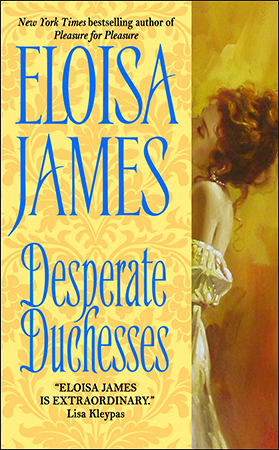
Exclusive Extras
Inside Desperate Duchesses
Warning! In describing relations between characters, I may wreck a book for you by making it clear who someone marries, or the outcome of a book. Please do not read about The Inside Take if you're wary of knowing who is paired with whom!
- I dedicated this book to my father, Robert Bly, winner of the National Book Award for Poetry. Least you think that I am the only one in the family writing of love, here’s a snippet of one of my father’s love poems, taken from Loving a Woman in Two Worlds (1985):
I want to be the man
And I am who will love you
When your hair is white.
- I also dedicated this book to Christopher Smart, whose poems I ruthlessly chopped and used for the Mad Marquess’s verse. Christopher Smart was slightly crazy – but not a truly bad poet. My favorite poem of his is called “For My Cat, Jeoffry”. Here’s a link to the whole poem. I love my cat Rosie, and Smart’s poem captures her:
For there is nothing sweeter than his peace when at rest.
For there is nothing brisker than his life when in motion.
- There’s a Shakespeare echo on page 36. Roberta says to be a duchess is consummation devoutly to be wished, but then she can’t remember where the quote came from. It’s from Hamlet in “To Be Or Not to Be” talking about death… a bleaker thing to wish for than Roberta’s comment about the title of duchess.
- Part of Roberta and Villiers’s conversation circles around a Shakespeare poem, The Rape of Lucrece. This is not a cheerful poem, and I don’t really recommend it for light reading. But if you’d like to dip in, here’s a link to the whole text.
- Damon makes fun of one of my favorite love poems on page 163: Christopher Marlowe’s “The Passionate Shepherd to his Love.” Marlowe doesn’t talk of parsnips but of making beds of roses for his beloved. Here’s the whole poem, for your pleasure.
- Want to know Damon’s point of view? Read the extra chapter three of Desperate Duchesses to find out!
- When I first designed the plot of Desperate Duchesses , I thought I would detail the chess games on the website. But you know…chess is complicated to follow and my guess is that few chess masters are going to check eloisajames.com to see whether I correctly notated the Center Game played in Leipzig in 1903 (which was Jemma and Villiers’ first match). So let me assure you that every game I describe was a true game, played between masters, as notated in a wonderful book called The Fireside Book of Chess. This book delights in exuberant comments, such as this:
“Blunders have been made by all classes of chess players – beginners, dubs, tyros, wood-pushers, amateurs, grandmasters and World Champions! Take heart, all of you! For here is an example of an almost incredible blunder made by the most brilliant player that ever lived! Alekhine, conqueror of Capablanca for the World Championship, profound analyst without peer, creator of dazzling combinations, makes a horrible mistake…”
- The tone of excitement in this book was invaluable to me in shaping my own master chess players – and in visualizing Benjamin, who killed himself for love of the sport.






